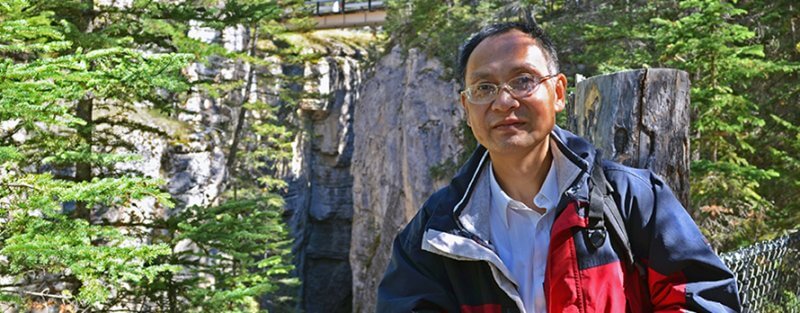Protecting wetland biodiversity is crucial, AU researcher says
The theme of World Environment Day 2020, celebrated June 5, is biodiversity—the importance of which is not lost on Athabasca University researcher Dr. Junye Wang.

A Professor and CAIP Research Chair in Computational Sustainability and Environmental Analytics in the Faculty of Science & Technology, his work with computer modelling in the Athabasca River Basin is helping to protect biodiversity and wetlands in northern Alberta.
“The health of wetland and river systems is of critical importance for sustainable economic development and biodiversity,” he said.
Wang explained wetlands cover only about three per cent of Earth’s surface, but store 15 to 30 per cent of global soil carbon as peat while providing habitats to support biodiversity on land and underwater. They can also affect every aspect of human health by providing clean air and water, nutrient cycles, and climate change mitigation.
Unfortunately, human activity and climate change threaten stability of wetlands and river systems. Pressures like deforestation, wildfire, mining, and glacial retreat can lead to the degradation of water quality, habitat loss, greenhouse gas emissions, and loss of biodiversity.
If we continue on this path, biodiversity loss will have severe implications for humanity and indigenous communities, including the collapse of water, food, and health systems. Biodiversity in wetlands is an urgent and existential concern in northern Alberta.
“Sustainable management of wetlands and river systems requires a fundamental understanding of how ecosystem processes and functions respond to change and how we could move towards improving the water and air around us.”
– Dr. Junye Wang, Professor and CAIP Research Chair in Computational Sustainability and Environmental Analytics
Wang said wetland losses increase every day, and if it continues it could have severe implications for humanity, including the collapse of water, food, and health systems—describing biodiversity in wetlands as “an urgent and existential concern in northern Alberta.”
There is reason for optimism, as many people and policy makers realize that healthy communities depend on healthy wetland ecosystems and are becoming more active in conservation efforts. But we must do more to improve air quality, water quality, and biodiversity—and to understand how best to do that, we need information.
“Sustainable management of wetlands and river systems requires a fundamental understanding of how ecosystem processes and functions respond to change and how we could move towards improving the water and air around us,” he said.
Wang leads a team of post-doctoral researchers in the Athabasca River Basin Research Institute (ARBRI) and has focused efforts on this pressing environmental issue in northern Alberta.
In recently published work they have built system models to look at the effects of snow, climate change, and carbon dioxide emissions, increasing understanding of interactions between climate change, land-use changes, wetland ecosystems, and wildlife habitats.
“World Environment Day is a great opportunity for us to learn about, appreciate, and take action to conserve wetland biodiversity and the ecosystem services in the Athabasca River Basin,” he said.